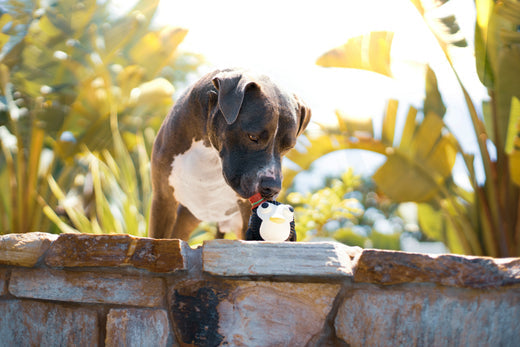Honey is often celebrated for its health benefits in humans, but can our furry friends enjoy this sweet treat too? If you're wondering, "Is honey safe for dogs?" or curious about its potential health benefits, the answer is yes—with some precautions. This article explores how honey can be safely introduced to your dog's diet, its potential health benefits, and what to watch out for when sharing this natural sweetener with your canine companion.
Can Dogs Eat Honey?
Yes, dogs can safely consume honey in moderation. Honey is not toxic to dogs and contains natural sugars, vitamins, and antioxidants that can offer several health benefits. However, it’s essential to give your pup the right amount and ensure they don’t have any pre-existing conditions that might make honey unsuitable for them.
How Much Honey Can I Give My Dog?
The key to feeding your dog honey is moderation. Dogs should only have small amounts based on their size:
Small dogs: No more than half a teaspoon per day.
Medium dogs: About one teaspoon per day.
Large dogs: Up to one tablespoon per day.
Start with a smaller amount to ensure your dog tolerates honey well. Overfeeding can lead to weight gain or upset stomachs because of its high sugar content.
How Does Honey Help Dogs?
Honey offers several benefits for dogs when given in appropriate amounts:
- Energy Boost: Honey is rich in natural sugars, providing a quick and safe energy boost for dogs, especially active or working breeds.
- Soothing Sore Throats: Just like in humans, honey can coat a dog’s throat, offering relief from mild irritation or coughs.
- Digestive Aid: Raw honey contains enzymes and natural probiotics that support gut health, helping with digestion and reducing occasional bloating.
- Skin and Wound Care: Honey, particularly raw honey, has natural antibacterial properties. If your dog has minor cuts, scrapes, or burns, honey can act as a topical treatment to aid healing and prevent infection.
- Seasonal Allergy Relief: Local honey contains small amounts of local pollen. When dogs consume it regularly, it may help build their tolerance to seasonal allergens, potentially reducing allergy symptoms like itching or sneezing.
Is Honey a Natural Antibiotic for Dogs?
Yes, honey has natural antibacterial and antifungal properties, making it a mild yet effective natural antibiotic for dogs. For example, our British Apple Orchard Honey, known for its purity and raw, unpasteurized qualities, can be applied topically to minor wounds to prevent infection or given in small oral doses to support overall health. The antibacterial activity of raw honey helps to combat harmful bacteria while promoting healing, thanks to its natural enzymes and hydrogen peroxide production. Always consult your vet before use.
Precautions When Giving Honey to Dogs
While honey is generally safe for dogs, there are several precautions to consider. Being calorie-dense, excessive amounts can lead to weight gain, especially in less active dogs. Additionally, its high sugar content makes it unsuitable for diabetic dogs as it can cause harmful blood sugar spikes. Puppies under one-year-old and immune-compromised dogs should avoid raw honey due to the potential presence of botulism spores, which their systems may struggle to handle. Lastly, some dogs may have allergic reactions to honey or its pollen content, so it’s best to start with a tiny amount and monitor for adverse effects like vomiting, diarrhea, or itching.
How to Give Honey to Your Dog
If your dog is ready to try honey, here are some simple ways to introduce it:
- Directly on a Spoon: Dogs often love the taste of honey and will lick it straight from a spoon.
- Mixed in Food: Add a drizzle to your dog’s kibble or wet food for added flavor.
- In Homemade Treats: Bake dog-friendly treats using honey as a natural sweetener.
- As a Topping: Spread a thin layer on fruits like apples or carrots for a healthy snack.
When to Avoid Honey for Dogs
If your dog is overweight, diabetic, or has certain health conditions, honey may not be suitable. Consult your veterinarian before introducing honey to your dog’s diet if you’re unsure about its safety.
The Final Buzz: Is Honey Safe for Dogs?
So, is honey toxic to dogs? Absolutely not—but it should always be offered in moderation and with careful consideration of your dog’s health and dietary needs. With its natural sweetness and host of benefits, honey can be a delightful addition to your pup’s treat rotation. Whether you’re using it to soothe a scratchy throat, promote healing, or simply as a tasty reward, honey is a safe and versatile option for most dogs.
Always remember to consult your veterinarian before introducing any new food into your dog’s diet, including honey. Done responsibly, honey can be a sweet way to show your canine companion some extra love.
References
Animal Friends. Is honey safe for dogs? What are the benefits, and can it help treat seasonal allergies? Retrieved from https://www.animalfriends.co.uk/dog/dog-advice/dog-health-problems/is-honey-safe-for-dogs-what-are-the-benefits-and-can-it-help-treat-seasonal-allergies/
American Kennel Club (2022). Can Dogs Eat Honey? Retrieved from https://www.akc.org/expert-advice/nutrition/can-dogs-eat-honey/
PetMD (2023). Can Dogs Eat Honey? Retrieved from https://www.petmd.com/dog/nutrition/can-dogs-eat-honey

